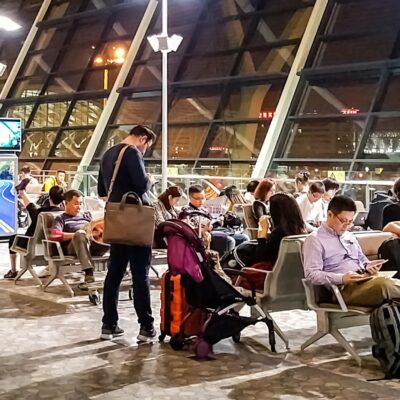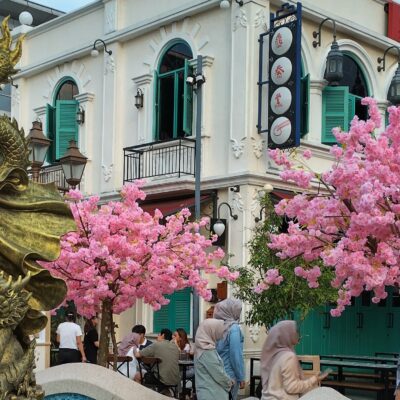Terrorism remains a global topic of concern. In Indonesia, the situation is not as critical as it was in the aftermath of the Bali bombing tragedy in 2002, but this year it was assessed as being in the top 30 nations out of 79 where terrorism has had the highest impact.
Indonesia’s terrorism agency has adopted a multi-pronged counterterrorism approach that encompasses the role of society and communities, as well as counter-terrorism powers for law enforcement officials.
This article examines the existence of varying perspectives within civil society on terrorism and identifies potential detrimental side effects of the government’s approach. I draw on interviews with 32 informants, including policy makers, former extremists, and activists from Civil Society Organisations (CSOs) from 10 February 2021 to 25 May 2023. The informants were selected with the help of individuals closely connected to anti-terror initiatives via direct affiliations with the government’s anti-terror program.
The role of civil society in countering extremism
In 2006, the United Nations General Assembly introduced a comprehensive counterterrorism strategy, endorsed by member states, which required the collective efforts of multiple stakeholders, including civil society. The Strategy unequivocally states that terrorism in any form is unacceptable, and that Member States should take practical and coordinated measures to prevent and combat terrorism. These measures encompass a broad spectrum of actions, including bolstering States’ counterterrorism capabilities by acknowledging the significant role of Member States in collaborating with civil society, including women-led organisations, to achieve UN Charter principles and counter-terrorism objectives, as part of a comprehensive societal strategy.
In Western countries, such as Australia, civil society’s participation is through Muslim communities’ involvement in so-called ‘social harmony’ programs, such as interfaith and intercultural activities. Scholars and others have questioned the effectiveness of these measures and argued that they have the unintended consequence of securitising Muslim diaspora communities.
In Indonesia, the involvement of civil society in counterterrorism remains a subject of debate, with no clear role and partnership model established. Nevertheless, the National Counterterrorism Agency (BNPT) has recognised the significance of civil society engagement. The recent former head of BNPT , Dr Boy Rafli Amar, described civil society as the ‘vaccine’ to extremism due to its ability to develop and emphasise the national values of Pancasila (such as democracy and justice), and Bhinneka Tunggal Ika (Unity in Diversity) as national guiding principles.
Involving CSOs is vital for the prevention and early detection of potential terrorism. Policy analysts Irfan Amali and Utami Nurhasanah state that CSOs have an important role in preventing and countering violent extremism because they possess the network strength and proximity to key actors, especially among hard-to-reach grassroots groups. International relations and counterterrorism scholar Ridwan Wachid advises that community participation is vital to counterterrorism efforts as a key source of information about local activities.
The involvement of civil society is crucial to anti-terror programs, especially in contexts where direct government counter-terrorism measures are not trusted. This consideration has driven the government’s decision to issue Presidential Regulation (PERPRES) Number 7 of 2021, focusing on the national action plan for countering and preventing violent extremism.
Extremist groups such as Jemaah Islamiyah (JI) and Jamaah Ansharut Daulah (JAD)—who have been responsible for several terror attacks including the Bali bombings and attacks on Indonesian police forces—have been leveraging negative experiences with government counterterrorism measures to recruit members. Former convicted terrorists interviewed by me revealed that groups such as JI and JAD build a narrative of government injustice against Muslims, citing real or perceived discrimination. One informant stated that when he joined a terrorist group, he was given specific instructions as to with whom he could be friends and who was considered the enemy, including anyone who supported the Indonesian government. This narrative is spread by through campus mosques and recitation groups where extremists target potentially vulnerable individuals.
The counter-terrorism work of civil society in Indonesia
CSOs are involved in counter-terrorism measures in Indonesia in a number of different ways.
Several leading Islamic figures—KH Said Agil Siradj, the chairman of Nahdlatul Ulama (Indonesia’s largest Islamic organisation Indonesia with 150 million followers); Nasaruddin Umar the grand imam of Istiqlal Mosque; and several experts from Islamic universities in Indonesia—have held special meetings with Muslim extremists. For example, the leader of the Al-Qiyadah Al-Islamiyah sect, Ahmad Mussadeq, went through a ‘repentance’ process after meeting with Said Agil; and one informant attributes his deradicalisation to the grand Imam of Istiqlal, who dissuaded him from returning to foreign fighting.
Indirect de-radicalisation work has also been undertaken by civil society organisations, for example, the publication of media that promote a moderate Islamic discourse, islamina.id, islami.co, nurulwala.id, iqra.id and alif.id. These media platforms provide an alternative discourse, directing readers’ focus towards non-political Islamic topics such as Sufi studies, the history and progress of Islamic civilization, and counter-discourses which respond to extremist content found in other media outlets. Notably, some of these Islamic media channels have gained considerable readership according to Alexa rankings. NU Online, for instance, has secured the top position among Indonesia’s numerous Islamic media sources in 2020, with a monthly readership of up to 5,000 individuals.
CSOs such as the Pesantren Study Centre (PSP), the Centre for Community and Pesantren Development (P3M), and the Islamic Learning Community (KBI), have held training sessions for religious leaders and Islamic study groups (Rohis) in schools with limited hours for Islamic lessons. They carry out regular or sequential training sessions to support anti-terror programs, covering a spectrum of activities ranging from raising awareness about the perils of terrorism among young religious leaders to acquiring skills in utilising information communication technology to bolster moderate Islamic discourse.
The problem of a lack of trust in CSOs’ counter-terrorism work
Engaging civil society organizations (CSOs) in anti-terrorism efforts has advantages. However, a crucial aspect to consider is the potential consequence of CSOs becoming closely aligned with the government. This alignment could generate public suspicion, transforming them from community facilitators into extensions of the government.
This concern is highlighted by one informant’s unsettling experience during training. The informant conducted awareness sessions on extremism, which were initially well-received by participants (individuals who were assessed as being at risk of being involved in extremist activities) and several community leaders in the area requested further lectures for their communities. However, the informant stated that the subsequent audiences seemed disinterested and were not receptive to the content of his presentation. Similarly, another informant who is a facilitator of an anti-terror programme said he was perceived as working for the government. He holds this belief due to the contrasting level of enthusiasm exhibited by participants when he serves as a facilitator for other programs clearly not sponsored by the government.
These accounts underline the need for a cautious approach to maintaining CSOs’ credibility and community-centric roles amidst their participation in counter-terrorism initiatives. Community policing could lead to a breakdown of trust of CSO groups and that this could in turn be leveraged by terrorists particularly if the CSOs come to be seen as an extension of government counter-terrorism endeavours.
The most important element of CSOs is that they are independent from government, but this is not widely understood. As a consequence, several CSO activists working in anti-terrorism programmes who were informants in this research experienced opposition from the community to their work because they were seen as an extension of the government or foreign agents. This has serious consequences: none of the informants were successful in integrating communities labelled as radical into groups that were considered tolerant, although they did have some success in communities which were receptive to their work.
The problem of a lack of definition of terrorism in Indonesia
As philosopher Jürgen Habermas noted in 2013, the war against terrorism is a war against something that is not easily defined. The Indonesian government formulated a broad definition in its anti-terror law of 2018, but it’s not clear exactly to whom the ‘war against terrorists’ is directed. A broad definition allows the government to anticipate numerous scenarios, but it can give decision-makers the leeway to apply the law inconsistently. There has, for example, been debate on whether armed criminals in Papua should be charged with terrorism. In order for a counter-terrorist program to be successful it is crucial that all parties involved have a clear understanding of its objectives and parameters.
The lack of clarity in the definition significantly impacts the role of civil society in counterterrorism and the potential issues arising from it. For instance, the registered volunteers and community leaders working for CSOs in a community policy context might become seen as government security forces. Establishing clear objectives and parameters for all parties involved in counter-terrorism programs is essential for their success.
The problem of stereotyping
The government’s extensive anti-terrorism campaign has been successful in raising public awareness about the reality of terrorism. However, this awareness has resulted in the formation of stereotypes about terrorists, associating them with specific physical characteristics and attire.
The data collected for this research shows that those involved in counterterrorism for CSOs work tend to associate terrorists with specific communities and individuals displaying particular characteristics rather than those who fall within the legal definition of terrorism. For example, one of my informants spoke of an experience he found terrifying, relating to a group of bearded men wearing cingkrang pants (a type of loose pants associated with Muslims). The informant feared the men were terrorists based on their appearance. There have been many instances in Indonesia where individuals wearing cingkrang pants, beards or veils have been wrongly identified as members of radical Islamic groups, leading to unwarranted suspicion. Another informant, who participated in a terrorism prevention training program, identified people wearing certain clothes as a group to be vigilant against, contradicting the guidance provided during the training that did not recommend using physical characteristics as a basis for suspicion.
Conclusion
The need to involve civil society in tackling terrorism issues is undisputable, but there are significant challenges.
There is a need for clear objectives and parameters for all parties involved in counter-terrorism programs, a re-evaluation of the approach to community engagement, and a better understanding of the role of CSOs in counterterrorism.
The author extends heartfelt gratitude to Prof. Adam Possamai from Western Sydney University for generously providing valuable insights and support throughout the research process. His willingness to review the work and offer constructive feedback during the writing process has been immensely appreciated.
Image: People watching a speech by Indonesian President Joko Widodo on a screen at a Pesantren in Java, February 3, 2018. Credit: Author.




